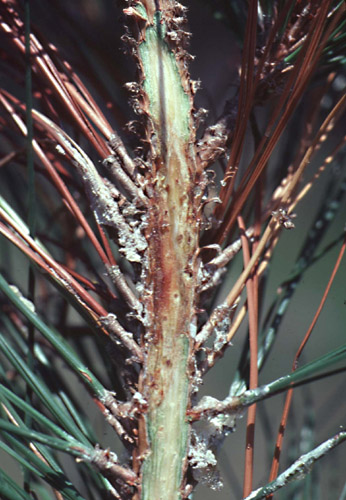Pitch Canker
Natural History

Resin-soaked xylem | Photo credit: G. Blakeslee - SFRC, Univ. of Florida
Pitch canker is a disease caused by the fungus Fusarium moniliforme var. subglutinans. The disease can be a serious problem in southern pine plantations, because it kills the terminal shoot of growing trees. Infected trees usually survive and grow a replacement shoot, but the resulting trunks have forks or bends - making them weaker and less valuable.
The pitch canker fungus produces spores in small salmon-colored structures that are produced on infected shoots. The spores are carried by wind or insects to infect new trees. Generally, an infection cannot occur through intact tissue. Instead, the spores enter hosts through wounds created by physical damage or insects - including holes made by the Deodar Weevil, which feeds on green stems of pines and cedars.
One the fungus has entered the tree, the tree develops a localized area of dead tissues known as a "canker," and large amounts of pitch begin to flow around it. The pathogen also induces resin-soaking of the xylem. It is from this characteristic and abundant production of resin (pitch) that the disease takes its name. The infection can slow the growth of the tree and deform it, but rarely does the tree die. Most infected trees survive but their stem form may be greatly changed.
